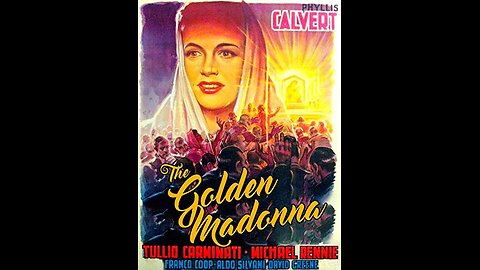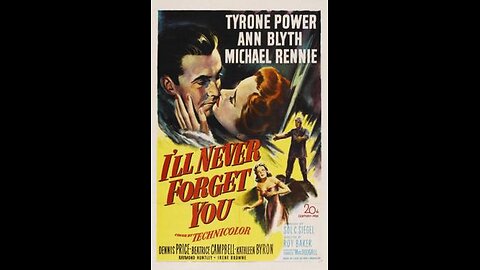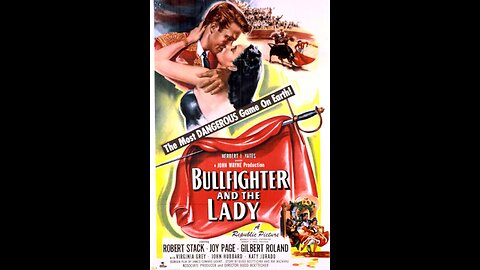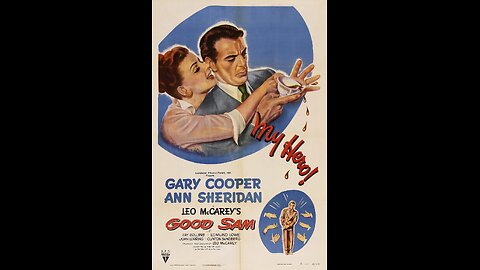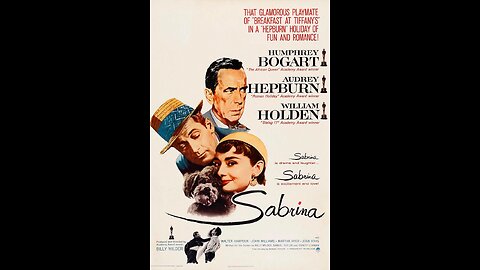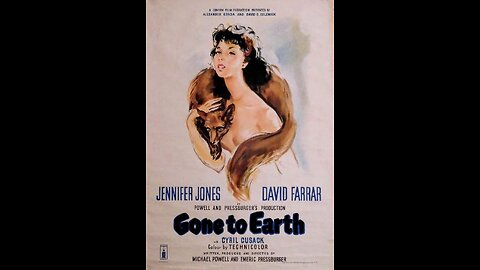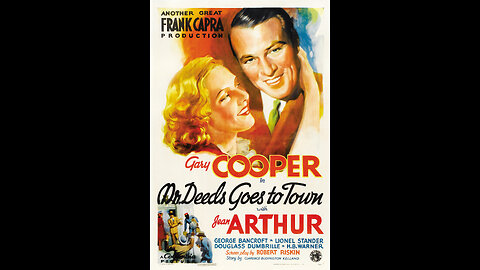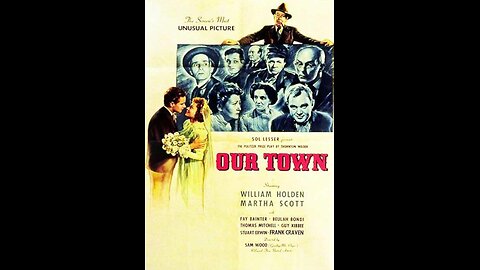
Romantic Dramas
52 videos
Updated 10 days ago
The Best Romantic Dramas from the Golden Era
-
Our Town (1940) | Directed by Sam Wood
 Classic Films & Movies ArchiveOur Town is a poignant drama based on Thornton Wilder’s Pulitzer Prize-winning play of the same name. Set in the fictional small town of Grover’s Corners, New Hampshire, the film follows the simple lives of its residents, focusing on the love story between George Gibbs and Emily Webb. Narrated by the Stage Manager, who breaks the fourth wall and offers reflections on time, change, and mortality, the story is a meditation on the beauty of everyday life and the fleeting nature of human experience. Genre: Drama, Romance Director: Sam Wood Sam Wood was a successful and versatile American film director known for his work in both drama and comedy during the 1930s and 1940s. He directed a number of well-regarded films, including Goodbye, Mr. Chips and Kings Row. Wood had a clear, classical directing style that emphasized character and story over visual flair. His films often conveyed strong emotional themes and moral values, making him a dependable studio craftsman in Hollywood’s Golden Age. Star Cast: - William Holden as George Gibbs - Martha Scott as Emily Webb - Fay Bainter as Mrs. Gibbs - Beulah Bondi as Mrs. Webb - Thomas Mitchell as Mr. Webb - Guy Kibbee as Mr. Gibbs - Frank Craven as the Stage Manager Our Town was well received by audiences and critics for its heartfelt storytelling and faithful adaptation of Wilder’s play. The film captured the simplicity and sincerity of small-town American life, though it altered the play’s famously somber ending to suit cinematic tastes of the time. Martha Scott, reprising her Broadway role, earned an Academy Award nomination for Best Actress. The film was also nominated for Best Picture and several other awards. It remains a moving and nostalgic portrayal of love, community, and the passage of time. Fun Facts: - The film adaptation softened the play’s original ending, giving it a more optimistic resolution, which was controversial among some critics and fans of the stage version. - Martha Scott and Frank Craven both appeared in the original Broadway production and recreated their roles for the screen. - This was one of William Holden’s earliest starring roles and helped establish his career in Hollywood. - The film’s narration and structure preserve the unique theatrical style of the play, with the Stage Manager guiding viewers through time and space. - Our Town continues to be widely performed on stage and studied in schools, making it one of the most enduring works of American theater. Our Town (1940) stands as a quiet yet powerful tribute to the value of ordinary life, reminding audiences that even the smallest moments hold great meaning when viewed through the lens of memory and love. * This Rumble Movie Channel is comprehensively indexed on https://kinoquick.com - find you favourite movies fast & free! * Follow this channel to be notified of daily movie updates.293 views
Classic Films & Movies ArchiveOur Town is a poignant drama based on Thornton Wilder’s Pulitzer Prize-winning play of the same name. Set in the fictional small town of Grover’s Corners, New Hampshire, the film follows the simple lives of its residents, focusing on the love story between George Gibbs and Emily Webb. Narrated by the Stage Manager, who breaks the fourth wall and offers reflections on time, change, and mortality, the story is a meditation on the beauty of everyday life and the fleeting nature of human experience. Genre: Drama, Romance Director: Sam Wood Sam Wood was a successful and versatile American film director known for his work in both drama and comedy during the 1930s and 1940s. He directed a number of well-regarded films, including Goodbye, Mr. Chips and Kings Row. Wood had a clear, classical directing style that emphasized character and story over visual flair. His films often conveyed strong emotional themes and moral values, making him a dependable studio craftsman in Hollywood’s Golden Age. Star Cast: - William Holden as George Gibbs - Martha Scott as Emily Webb - Fay Bainter as Mrs. Gibbs - Beulah Bondi as Mrs. Webb - Thomas Mitchell as Mr. Webb - Guy Kibbee as Mr. Gibbs - Frank Craven as the Stage Manager Our Town was well received by audiences and critics for its heartfelt storytelling and faithful adaptation of Wilder’s play. The film captured the simplicity and sincerity of small-town American life, though it altered the play’s famously somber ending to suit cinematic tastes of the time. Martha Scott, reprising her Broadway role, earned an Academy Award nomination for Best Actress. The film was also nominated for Best Picture and several other awards. It remains a moving and nostalgic portrayal of love, community, and the passage of time. Fun Facts: - The film adaptation softened the play’s original ending, giving it a more optimistic resolution, which was controversial among some critics and fans of the stage version. - Martha Scott and Frank Craven both appeared in the original Broadway production and recreated their roles for the screen. - This was one of William Holden’s earliest starring roles and helped establish his career in Hollywood. - The film’s narration and structure preserve the unique theatrical style of the play, with the Stage Manager guiding viewers through time and space. - Our Town continues to be widely performed on stage and studied in schools, making it one of the most enduring works of American theater. Our Town (1940) stands as a quiet yet powerful tribute to the value of ordinary life, reminding audiences that even the smallest moments hold great meaning when viewed through the lens of memory and love. * This Rumble Movie Channel is comprehensively indexed on https://kinoquick.com - find you favourite movies fast & free! * Follow this channel to be notified of daily movie updates.293 views -
The Golden Madonna (1949) | Directed by Luigi Carpentieri & Ladislao Vajda
 Classic Films & Movies Archive"The Golden Madonna" is a post-war romantic adventure film set in Italy, centering on Patricia, a young Englishwoman who inherits a rural Italian estate. Upon arrival, she accidentally gives away a cherished religious icon—the golden Madonna—that holds deep significance for the local villagers. Realizing her mistake, Patricia sets out across the Italian countryside to retrieve the sacred object, aided by a charming ex-British Army officer. Their journey becomes one of self-discovery, cultural connection, and budding romance. Genre: Drama, Romance, Adventure Director: Luigi Carpentieri and Ladislao Vajda Luigi Carpentieri was an Italian film producer and occasional director, active in the 1940s and 1950s. He was best known for his work behind the scenes, producing a number of notable Italian films during the post-war period. "The Golden Madonna" is one of his few directorial efforts, co-directed with Vajda. Ladislao Vajda was a Hungarian-Spanish film director born on August 18, 1906, in Budapest. He worked across several European film industries, including Hungary, Italy, Spain, and Germany. Vajda gained acclaim for his stylistic versatility and attention to atmosphere and character. His best-known works came in the 1950s with Spanish classics like "Miracle of Marcelino" and the thriller "The Man Who Watched Trains Go By." "The Golden Madonna" is an early example of his international work and visual storytelling. Star Cast: - Phyllis Calvert as Patricia - Michael Rennie as Captain Mike Christie - Tullio Carminati as Prince Paoleti - David Greene as Tony - Nancy Price as Aunt Mary - Guido Celano as Giuseppe "The Golden Madonna" received modest attention upon its release, with audiences appreciating its scenic Italian backdrop and the charm of its leads. It wasn’t a major box office hit but gained a warm reception, especially among British viewers, for its blend of travelogue, romance, and light drama. Over time, it has become a bit of a cult favorite for fans of post-war European cinema and those drawn to romantic storytelling set against picturesque locations. Fun Facts: - The film was one of the first British-Italian co-productions after World War II, showcasing post-war collaboration between the two countries' film industries. - It features stunning on-location shooting across southern Italy, including rural villages and coastal towns, offering an authentic look at Italy in the late 1940s. - Phyllis Calvert, known for her roles in British melodramas, was cast to give the film broad appeal in English-speaking markets. - Michael Rennie would later gain international fame for his role as Klaatu in "The Day the Earth Stood Still" (1951). - The title refers to an actual religious icon, and the film’s plot reflects the deep reverence for such objects in many Italian communities. * This Rumble Movie Channel is comprehensively indexed on https://kinoquick.com - find you favourite movies fast & free! * Follow this channel to be notified of daily movie updates.241 views 1 comment
Classic Films & Movies Archive"The Golden Madonna" is a post-war romantic adventure film set in Italy, centering on Patricia, a young Englishwoman who inherits a rural Italian estate. Upon arrival, she accidentally gives away a cherished religious icon—the golden Madonna—that holds deep significance for the local villagers. Realizing her mistake, Patricia sets out across the Italian countryside to retrieve the sacred object, aided by a charming ex-British Army officer. Their journey becomes one of self-discovery, cultural connection, and budding romance. Genre: Drama, Romance, Adventure Director: Luigi Carpentieri and Ladislao Vajda Luigi Carpentieri was an Italian film producer and occasional director, active in the 1940s and 1950s. He was best known for his work behind the scenes, producing a number of notable Italian films during the post-war period. "The Golden Madonna" is one of his few directorial efforts, co-directed with Vajda. Ladislao Vajda was a Hungarian-Spanish film director born on August 18, 1906, in Budapest. He worked across several European film industries, including Hungary, Italy, Spain, and Germany. Vajda gained acclaim for his stylistic versatility and attention to atmosphere and character. His best-known works came in the 1950s with Spanish classics like "Miracle of Marcelino" and the thriller "The Man Who Watched Trains Go By." "The Golden Madonna" is an early example of his international work and visual storytelling. Star Cast: - Phyllis Calvert as Patricia - Michael Rennie as Captain Mike Christie - Tullio Carminati as Prince Paoleti - David Greene as Tony - Nancy Price as Aunt Mary - Guido Celano as Giuseppe "The Golden Madonna" received modest attention upon its release, with audiences appreciating its scenic Italian backdrop and the charm of its leads. It wasn’t a major box office hit but gained a warm reception, especially among British viewers, for its blend of travelogue, romance, and light drama. Over time, it has become a bit of a cult favorite for fans of post-war European cinema and those drawn to romantic storytelling set against picturesque locations. Fun Facts: - The film was one of the first British-Italian co-productions after World War II, showcasing post-war collaboration between the two countries' film industries. - It features stunning on-location shooting across southern Italy, including rural villages and coastal towns, offering an authentic look at Italy in the late 1940s. - Phyllis Calvert, known for her roles in British melodramas, was cast to give the film broad appeal in English-speaking markets. - Michael Rennie would later gain international fame for his role as Klaatu in "The Day the Earth Stood Still" (1951). - The title refers to an actual religious icon, and the film’s plot reflects the deep reverence for such objects in many Italian communities. * This Rumble Movie Channel is comprehensively indexed on https://kinoquick.com - find you favourite movies fast & free! * Follow this channel to be notified of daily movie updates.241 views 1 comment -
I'll Never Forget You (1951) | Directed by Roy Ward Baker
 Classic Films & Movies ArchiveI'll Never Forget You is a romantic fantasy drama that tells the story of an American nuclear physicist who finds himself mysteriously transported back to 18th-century England, where he falls in love with a beautiful woman. The scientist, Peter Standish, has always felt a strange connection to an ancestor of the same name. When a lightning storm transports him to the past, he assumes his ancestor’s identity and begins a passionate romance with Helen Pettigrew. However, as he navigates the customs and rigid expectations of the time, he realizes that fate may not allow him to remain in the past forever. Genre: Fantasy, Romance, Drama Director: Roy Ward Baker Roy Ward Baker was a British film director known for his work in both Hollywood and the UK film industry. Born in 1916, he gained international recognition for directing A Night to Remember (1958), a critically acclaimed depiction of the Titanic disaster. His career spanned various genres, including horror, science fiction, and period dramas. Baker’s ability to craft atmospheric and engaging narratives made him a respected director in British cinema. Star Cast: - Tyrone Power as Peter Standish - Ann Blyth as Helen Pettigrew - Michael Rennie as Roger Pettigrew - Dennis Price as Tom Pettigrew - Beatrice Campbell as Kate Pettigrew - Kathleen Byron as Duchess of Devonshire The film received positive reviews upon release, particularly for its romantic and atmospheric storytelling. Tyrone Power’s performance was praised for bringing both emotional depth and charm to the role of Peter Standish. The film’s dreamlike quality and historical detail appealed to audiences who enjoyed romantic fantasy stories. Although not as widely known today, it remains an interesting and visually stunning entry in the fantasy-romance genre. Fun Facts: - The film is a remake of the 1933 movie Berkeley Square, which starred Leslie Howard in the same role. - The story is based on the play Berkeley Square by John L. Balderston, which itself was inspired by Henry James’s unfinished novel The Sense of the Past. - Tyrone Power, known primarily for his swashbuckling adventure films, took on a more introspective and romantic role in this movie. - The cinematography uses both black and white and Technicolor, with the past sequences filmed in vibrant color to contrast with the present-day scenes. - The movie was one of Power’s final films before his untimely death in 1958, marking one of his last romantic leading roles.359 views
Classic Films & Movies ArchiveI'll Never Forget You is a romantic fantasy drama that tells the story of an American nuclear physicist who finds himself mysteriously transported back to 18th-century England, where he falls in love with a beautiful woman. The scientist, Peter Standish, has always felt a strange connection to an ancestor of the same name. When a lightning storm transports him to the past, he assumes his ancestor’s identity and begins a passionate romance with Helen Pettigrew. However, as he navigates the customs and rigid expectations of the time, he realizes that fate may not allow him to remain in the past forever. Genre: Fantasy, Romance, Drama Director: Roy Ward Baker Roy Ward Baker was a British film director known for his work in both Hollywood and the UK film industry. Born in 1916, he gained international recognition for directing A Night to Remember (1958), a critically acclaimed depiction of the Titanic disaster. His career spanned various genres, including horror, science fiction, and period dramas. Baker’s ability to craft atmospheric and engaging narratives made him a respected director in British cinema. Star Cast: - Tyrone Power as Peter Standish - Ann Blyth as Helen Pettigrew - Michael Rennie as Roger Pettigrew - Dennis Price as Tom Pettigrew - Beatrice Campbell as Kate Pettigrew - Kathleen Byron as Duchess of Devonshire The film received positive reviews upon release, particularly for its romantic and atmospheric storytelling. Tyrone Power’s performance was praised for bringing both emotional depth and charm to the role of Peter Standish. The film’s dreamlike quality and historical detail appealed to audiences who enjoyed romantic fantasy stories. Although not as widely known today, it remains an interesting and visually stunning entry in the fantasy-romance genre. Fun Facts: - The film is a remake of the 1933 movie Berkeley Square, which starred Leslie Howard in the same role. - The story is based on the play Berkeley Square by John L. Balderston, which itself was inspired by Henry James’s unfinished novel The Sense of the Past. - Tyrone Power, known primarily for his swashbuckling adventure films, took on a more introspective and romantic role in this movie. - The cinematography uses both black and white and Technicolor, with the past sequences filmed in vibrant color to contrast with the present-day scenes. - The movie was one of Power’s final films before his untimely death in 1958, marking one of his last romantic leading roles.359 views -
Bullfighter and the Lady (1951) | Directed by Budd Boetticher
 Classic Films & Movies ArchiveBullfighter and the Lady is a romantic drama about an American in Mexico who becomes enamored with the art of bullfighting and the culture surrounding it. When aspiring filmmaker Chuck Regan arrives in Mexico, he is drawn to the spectacle of the bullring. Determined to prove himself, he convinces an aging matador, Manolo Estrada, to train him. As Chuck learns the discipline and danger of the sport, he also falls in love with Estrada’s beautiful daughter, Anita. His journey becomes one of respect, passion, and a deeper understanding of tradition and honor. Genre: Drama, Romance, Sports Director: Budd Boetticher Budd Boetticher was an American film director known for his work in Westerns and action films. Born in 1916, he had firsthand experience with bullfighting, which informed his direction of Bullfighter and the Lady. He gained prominence for directing a series of critically acclaimed Westerns starring Randolph Scott, often focusing on themes of honor and redemption. His unique storytelling style and deep appreciation for Mexican culture made him a respected figure in Hollywood. Star Cast: - Robert Stack as Chuck Regan - Joy Page as Anita de la Vega - Gilbert Roland as Manolo Estrada - Virginia Grey as Lisbeth - John Hubbard as Barney Flood - Katy Jurado as Chelo Estrada Bullfighter and the Lady was well received for its authentic portrayal of bullfighting and its emotional depth. Audiences praised the film’s respectful approach to Mexican culture and the dramatic tension between ambition, love, and tradition. Critics also commended Robert Stack’s performance, as well as the cinematography that captured the beauty and danger of the bullring. The film was nominated for an Academy Award for Best Original Story, and it remains a notable entry in Hollywood’s exploration of Spanish and Mexican traditions. Fun Facts: - The story was inspired by director Budd Boetticher’s own experiences as a young American training as a bullfighter in Mexico. - The film was originally much longer, but studio executives cut it down; years later, a restored version was released closer to Boetticher’s original vision. - Gilbert Roland, who played the matador Manolo Estrada, had a deep personal connection to Mexican heritage, bringing authenticity to his role. - This film was one of Budd Boetticher’s first major successes before he became widely recognized for his Westerns. - John Wayne served as a producer on the film, supporting Boetticher’s vision and helping bring the project to life. * This Rumble Movie Channel is comprehensively indexed on https://kinoquick.com - find you favourite movies fast & free! Subscribe to this channel to be notified of daily movie updates.300 views
Classic Films & Movies ArchiveBullfighter and the Lady is a romantic drama about an American in Mexico who becomes enamored with the art of bullfighting and the culture surrounding it. When aspiring filmmaker Chuck Regan arrives in Mexico, he is drawn to the spectacle of the bullring. Determined to prove himself, he convinces an aging matador, Manolo Estrada, to train him. As Chuck learns the discipline and danger of the sport, he also falls in love with Estrada’s beautiful daughter, Anita. His journey becomes one of respect, passion, and a deeper understanding of tradition and honor. Genre: Drama, Romance, Sports Director: Budd Boetticher Budd Boetticher was an American film director known for his work in Westerns and action films. Born in 1916, he had firsthand experience with bullfighting, which informed his direction of Bullfighter and the Lady. He gained prominence for directing a series of critically acclaimed Westerns starring Randolph Scott, often focusing on themes of honor and redemption. His unique storytelling style and deep appreciation for Mexican culture made him a respected figure in Hollywood. Star Cast: - Robert Stack as Chuck Regan - Joy Page as Anita de la Vega - Gilbert Roland as Manolo Estrada - Virginia Grey as Lisbeth - John Hubbard as Barney Flood - Katy Jurado as Chelo Estrada Bullfighter and the Lady was well received for its authentic portrayal of bullfighting and its emotional depth. Audiences praised the film’s respectful approach to Mexican culture and the dramatic tension between ambition, love, and tradition. Critics also commended Robert Stack’s performance, as well as the cinematography that captured the beauty and danger of the bullring. The film was nominated for an Academy Award for Best Original Story, and it remains a notable entry in Hollywood’s exploration of Spanish and Mexican traditions. Fun Facts: - The story was inspired by director Budd Boetticher’s own experiences as a young American training as a bullfighter in Mexico. - The film was originally much longer, but studio executives cut it down; years later, a restored version was released closer to Boetticher’s original vision. - Gilbert Roland, who played the matador Manolo Estrada, had a deep personal connection to Mexican heritage, bringing authenticity to his role. - This film was one of Budd Boetticher’s first major successes before he became widely recognized for his Westerns. - John Wayne served as a producer on the film, supporting Boetticher’s vision and helping bring the project to life. * This Rumble Movie Channel is comprehensively indexed on https://kinoquick.com - find you favourite movies fast & free! Subscribe to this channel to be notified of daily movie updates.300 views -
Good Sam (1948) | Directed by Leo McCarey
 Classic Films & Movies ArchiveGood Sam is a romantic comedy-drama that centers on Sam Clayton, a kind-hearted department store manager who can't resist helping others, often at the expense of his own family's well-being. His unwavering generosity leads to a series of humorous and challenging situations, testing the patience of his wife, Lu, and prompting reflections on the balance between altruism and personal responsibility. Genre: Romantic Comedy-Drama Director: Leo McCarey Leo McCarey was an American film director, screenwriter, and producer renowned for his work in both comedy and drama. Born in 1898, he directed classics such as "Duck Soup" (1933) with the Marx Brothers and "The Awful Truth" (1937), which earned him an Academy Award for Best Director. McCarey's films often explored themes of human kindness and moral dilemmas, blending humor with heartfelt storytelling. Star Cast: - Gary Cooper as Sam Clayton - Ann Sheridan as Lu Clayton - Ray Collins as Reverend Daniels - Edmund Lowe as H.C. Borden - Joan Lorring as Shirley Mae Upon its release, "Good Sam" received mixed reviews. Some critics appreciated the film's exploration of altruism and Gary Cooper's portrayal of the benevolent protagonist. However, others felt the narrative was overly sentimental and lacked the sharpness of McCarey's earlier works. Despite the divided opinions, the film was among the higher-grossing movies of 1948, indicating a favorable audience reception. Fun Facts: - Director Leo McCarey shot two different endings for the film and used audience feedback from preview screenings to decide which one to use. - During production, Gary Cooper was called to testify before the House Un-American Activities Committee in October 1947, temporarily halting filming. - The film's original runtime was 130 minutes but was later edited down to 114 minutes for its reissue. - Ann Sheridan was loaned from Warner Bros. to play the role of Lu Clayton, showcasing her versatility beyond her typical "sassy" character portrayals. * This Rumble Movie Channel is comprehensively indexed on https://kinoquick.com - find you favourite movies fast & free! Subscribe to this channel to be notified of daily movie updates.246 views
Classic Films & Movies ArchiveGood Sam is a romantic comedy-drama that centers on Sam Clayton, a kind-hearted department store manager who can't resist helping others, often at the expense of his own family's well-being. His unwavering generosity leads to a series of humorous and challenging situations, testing the patience of his wife, Lu, and prompting reflections on the balance between altruism and personal responsibility. Genre: Romantic Comedy-Drama Director: Leo McCarey Leo McCarey was an American film director, screenwriter, and producer renowned for his work in both comedy and drama. Born in 1898, he directed classics such as "Duck Soup" (1933) with the Marx Brothers and "The Awful Truth" (1937), which earned him an Academy Award for Best Director. McCarey's films often explored themes of human kindness and moral dilemmas, blending humor with heartfelt storytelling. Star Cast: - Gary Cooper as Sam Clayton - Ann Sheridan as Lu Clayton - Ray Collins as Reverend Daniels - Edmund Lowe as H.C. Borden - Joan Lorring as Shirley Mae Upon its release, "Good Sam" received mixed reviews. Some critics appreciated the film's exploration of altruism and Gary Cooper's portrayal of the benevolent protagonist. However, others felt the narrative was overly sentimental and lacked the sharpness of McCarey's earlier works. Despite the divided opinions, the film was among the higher-grossing movies of 1948, indicating a favorable audience reception. Fun Facts: - Director Leo McCarey shot two different endings for the film and used audience feedback from preview screenings to decide which one to use. - During production, Gary Cooper was called to testify before the House Un-American Activities Committee in October 1947, temporarily halting filming. - The film's original runtime was 130 minutes but was later edited down to 114 minutes for its reissue. - Ann Sheridan was loaned from Warner Bros. to play the role of Lu Clayton, showcasing her versatility beyond her typical "sassy" character portrayals. * This Rumble Movie Channel is comprehensively indexed on https://kinoquick.com - find you favourite movies fast & free! Subscribe to this channel to be notified of daily movie updates.246 views -
Sabrina (1954) | Directed by Billy Wilder
 Classic Films & Movies Archive"Sabrina" is a 1954 American romantic comedy-drama directed by Billy Wilder. The film tells the story of Sabrina Fairchild, the young daughter of the Larrabee family's chauffeur, who returns from Paris transformed into a sophisticated woman. Her newfound elegance catches the attention of both Larrabee brothers: the fun-loving playboy David and his serious, business-minded brother Linus. Genre: Romantic Comedy-Drama Director: Billy Wilder Billy Wilder (1906–2002) was an Austrian-born American filmmaker renowned for his versatility in various genres, including film noir, comedies, and dramas. Over a career spanning five decades, Wilder directed classics such as "Double Indemnity," "Some Like It Hot," and "The Apartment," earning multiple Academy Awards and cementing his legacy as one of Hollywood's greatest directors. Star Cast: - Audrey Hepburn as Sabrina Fairchild - Humphrey Bogart as Linus Larrabee - William Holden as David Larrabee - John Williams as Thomas Fairchild - Walter Hampden as Oliver Larrabee Upon its release, "Sabrina" received critical acclaim for its charming narrative and standout performances. Audrey Hepburn's portrayal of Sabrina was particularly lauded, further establishing her as a leading actress of the time. The film was nominated for six Academy Awards, winning Best Costume Design for Edith Head. Its enduring appeal has solidified "Sabrina" as a classic in American cinema. Fun Facts: 1. The film is based on the 1953 play "Sabrina Fair" by Samuel A. Taylor. 2. Edith Head won the Academy Award for Best Costume Design; however, many of Audrey Hepburn's costumes were designed by French couturier Hubert de Givenchy, marking the beginning of a lifelong collaboration between Hepburn and Givenchy. 3. Humphrey Bogart was not the first choice for the role of Linus Larrabee; Cary Grant was initially considered but declined the part. 4. The on-set relationship between Bogart and his co-stars was reportedly tense, with Bogart feeling out of place in the romantic comedy genre. 5. "Sabrina" was remade in 1995, directed by Sydney Pollack and starring Harrison Ford, Julia Ormond, and Greg Kinnear. * This Rumble Movie Channel is comprehensively indexed on https://kinoquick.com - find you favourite movies fast & free! Subscribe to this channel to be notified of daily movie updates.359 views
Classic Films & Movies Archive"Sabrina" is a 1954 American romantic comedy-drama directed by Billy Wilder. The film tells the story of Sabrina Fairchild, the young daughter of the Larrabee family's chauffeur, who returns from Paris transformed into a sophisticated woman. Her newfound elegance catches the attention of both Larrabee brothers: the fun-loving playboy David and his serious, business-minded brother Linus. Genre: Romantic Comedy-Drama Director: Billy Wilder Billy Wilder (1906–2002) was an Austrian-born American filmmaker renowned for his versatility in various genres, including film noir, comedies, and dramas. Over a career spanning five decades, Wilder directed classics such as "Double Indemnity," "Some Like It Hot," and "The Apartment," earning multiple Academy Awards and cementing his legacy as one of Hollywood's greatest directors. Star Cast: - Audrey Hepburn as Sabrina Fairchild - Humphrey Bogart as Linus Larrabee - William Holden as David Larrabee - John Williams as Thomas Fairchild - Walter Hampden as Oliver Larrabee Upon its release, "Sabrina" received critical acclaim for its charming narrative and standout performances. Audrey Hepburn's portrayal of Sabrina was particularly lauded, further establishing her as a leading actress of the time. The film was nominated for six Academy Awards, winning Best Costume Design for Edith Head. Its enduring appeal has solidified "Sabrina" as a classic in American cinema. Fun Facts: 1. The film is based on the 1953 play "Sabrina Fair" by Samuel A. Taylor. 2. Edith Head won the Academy Award for Best Costume Design; however, many of Audrey Hepburn's costumes were designed by French couturier Hubert de Givenchy, marking the beginning of a lifelong collaboration between Hepburn and Givenchy. 3. Humphrey Bogart was not the first choice for the role of Linus Larrabee; Cary Grant was initially considered but declined the part. 4. The on-set relationship between Bogart and his co-stars was reportedly tense, with Bogart feeling out of place in the romantic comedy genre. 5. "Sabrina" was remade in 1995, directed by Sydney Pollack and starring Harrison Ford, Julia Ormond, and Greg Kinnear. * This Rumble Movie Channel is comprehensively indexed on https://kinoquick.com - find you favourite movies fast & free! Subscribe to this channel to be notified of daily movie updates.359 views -
St. Martin's Lane / The Sidewalks of London (1938) | A British romantic drama directed by Tim Whelan
 Classic Films & Movies Archive"St. Martin's Lane" is a British romantic drama released in 1938, directed by Tim Whelan. The film, also known as "Sidewalks of London" in the United States, stars Charles Laughton, Vivien Leigh, and Rex Harrison. Set in London's bustling entertainment district, the story revolves around the lives of street performers and the unlikely romance that develops between two central characters. The narrative centers on Charles Staggers (Charles Laughton), a talented and kind-hearted busker who performs on St. Martin's Lane, entertaining passersby with his violin. Charles has a strong bond with a fellow street performer, Libby (Vivien Leigh), a young and ambitious woman who dreams of becoming a successful singer. Despite their camaraderie, Libby aspires for greater success and seizes an opportunity to work with a well-known and suave impresario, Harley (Rex Harrison). As Libby rises to fame, Charles grapples with the realization that their paths may be diverging. The film explores themes of love, sacrifice, and the pursuit of one's dreams, all set against the backdrop of the lively and colorful atmosphere of London's theatrical scene. Charles Laughton's portrayal of the gentle and selfless Charles Staggers is a standout performance, showcasing his versatility as an actor. Vivien Leigh, before achieving international fame with "Gone with the Wind," delivers a compelling performance as the ambitious and conflicted Libby. Rex Harrison adds charm to the film as the charismatic showman, Harley. "St. Martin's Lane" captures the vibrancy of London's street life and theatrical milieu in the 1930s. The film provides a glimpse into the challenges faced by aspiring artists and the complex relationships that develop within the close-knit community of street performers. Tim Whelan's direction, combined with the cinematography of Mutz Greenbaum, captures the energy and atmosphere of St. Martin's Lane, creating a visually engaging backdrop for the characters' stories. The film incorporates musical performances and street scenes, enhancing the overall authenticity of the setting. While "St. Martin's Lane" may not be as widely celebrated as some other films of its era, it remains a charming and poignant exploration of love and ambition, featuring strong performances from its cast and offering a unique snapshot of London's theatrical world during the 1930s.104 views
Classic Films & Movies Archive"St. Martin's Lane" is a British romantic drama released in 1938, directed by Tim Whelan. The film, also known as "Sidewalks of London" in the United States, stars Charles Laughton, Vivien Leigh, and Rex Harrison. Set in London's bustling entertainment district, the story revolves around the lives of street performers and the unlikely romance that develops between two central characters. The narrative centers on Charles Staggers (Charles Laughton), a talented and kind-hearted busker who performs on St. Martin's Lane, entertaining passersby with his violin. Charles has a strong bond with a fellow street performer, Libby (Vivien Leigh), a young and ambitious woman who dreams of becoming a successful singer. Despite their camaraderie, Libby aspires for greater success and seizes an opportunity to work with a well-known and suave impresario, Harley (Rex Harrison). As Libby rises to fame, Charles grapples with the realization that their paths may be diverging. The film explores themes of love, sacrifice, and the pursuit of one's dreams, all set against the backdrop of the lively and colorful atmosphere of London's theatrical scene. Charles Laughton's portrayal of the gentle and selfless Charles Staggers is a standout performance, showcasing his versatility as an actor. Vivien Leigh, before achieving international fame with "Gone with the Wind," delivers a compelling performance as the ambitious and conflicted Libby. Rex Harrison adds charm to the film as the charismatic showman, Harley. "St. Martin's Lane" captures the vibrancy of London's street life and theatrical milieu in the 1930s. The film provides a glimpse into the challenges faced by aspiring artists and the complex relationships that develop within the close-knit community of street performers. Tim Whelan's direction, combined with the cinematography of Mutz Greenbaum, captures the energy and atmosphere of St. Martin's Lane, creating a visually engaging backdrop for the characters' stories. The film incorporates musical performances and street scenes, enhancing the overall authenticity of the setting. While "St. Martin's Lane" may not be as widely celebrated as some other films of its era, it remains a charming and poignant exploration of love and ambition, featuring strong performances from its cast and offering a unique snapshot of London's theatrical world during the 1930s.104 views -
Gone to Earth (1950) | British romantic drama film directed by Michael Powell & Emeric Pressburger
 Classic Films & Movies Archive"Gone to Earth" is a 1950 British romantic drama film directed by Michael Powell and Emeric Pressburger, collectively known as "The Archers." The film is based on the 1917 novel "Gone to Earth" by Mary Webb and stars Jennifer Jones, David Farrar, and Cyril Cusack in prominent roles. The story is set in the rural English countryside and revolves around the life of a young woman with a deep connection to nature. Hazel Woodus (Jennifer Jones) is a free-spirited and untamed young woman living in the Shropshire countryside with her father, Abel Woodus (Esmond Knight). Hazel has a strong affinity for nature and shares a special bond with the local wildlife. Her beauty and wild spirit attract the attention of the local men, including the wealthy squire Jack Reddin (David Farrar) and the compassionate minister Edward Marston (Cyril Cusack). Hazel, however, is more attuned to the natural world than to the complexities of human relationships. She finds solace in the woods and fields, often communicating with animals. When Jack Reddin becomes infatuated with Hazel and proposes to her, she reluctantly agrees. This decision sets in motion a series of events that will test Hazel's connection to the natural world and her ability to navigate the societal expectations and conflicts that arise from her relationships with Jack and Edward. As Hazel grapples with her own desires, the story explores themes of love, passion, and the clash between human desires and the purity of nature. "Gone to Earth" is known for its lush cinematography, capturing the picturesque beauty of the English countryside. The film is visually stunning, with Powell and Pressburger using the Shropshire landscape to create a dreamlike and ethereal atmosphere. The directors skillfully blend the natural world with the emotional and psychological landscape of the characters. Jennifer Jones delivers a compelling performance as Hazel, portraying the character's wildness and vulnerability. The film delves into Hazel's internal conflicts, torn between the primal instincts that draw her to the natural world and the societal expectations that shape her relationships. David Farrar and Cyril Cusack provide strong supporting performances as the contrasting figures vying for Hazel's affections. The love triangle becomes a focal point for exploring the clash between the human and natural realms. The film is also notable for its use of folklore and local traditions, adding a layer of mysticism to the narrative. The score by Brian Easdale complements the film's tone, enhancing the emotional depth of the story. While "Gone to Earth" received mixed reviews upon its initial release, it has gained appreciation over time for its unique visual style, thematic richness, and Jennifer Jones's compelling lead performance. The film is considered a classic in British cinema and remains a noteworthy entry in Powell and Pressburger's collaborative body of work.198 views
Classic Films & Movies Archive"Gone to Earth" is a 1950 British romantic drama film directed by Michael Powell and Emeric Pressburger, collectively known as "The Archers." The film is based on the 1917 novel "Gone to Earth" by Mary Webb and stars Jennifer Jones, David Farrar, and Cyril Cusack in prominent roles. The story is set in the rural English countryside and revolves around the life of a young woman with a deep connection to nature. Hazel Woodus (Jennifer Jones) is a free-spirited and untamed young woman living in the Shropshire countryside with her father, Abel Woodus (Esmond Knight). Hazel has a strong affinity for nature and shares a special bond with the local wildlife. Her beauty and wild spirit attract the attention of the local men, including the wealthy squire Jack Reddin (David Farrar) and the compassionate minister Edward Marston (Cyril Cusack). Hazel, however, is more attuned to the natural world than to the complexities of human relationships. She finds solace in the woods and fields, often communicating with animals. When Jack Reddin becomes infatuated with Hazel and proposes to her, she reluctantly agrees. This decision sets in motion a series of events that will test Hazel's connection to the natural world and her ability to navigate the societal expectations and conflicts that arise from her relationships with Jack and Edward. As Hazel grapples with her own desires, the story explores themes of love, passion, and the clash between human desires and the purity of nature. "Gone to Earth" is known for its lush cinematography, capturing the picturesque beauty of the English countryside. The film is visually stunning, with Powell and Pressburger using the Shropshire landscape to create a dreamlike and ethereal atmosphere. The directors skillfully blend the natural world with the emotional and psychological landscape of the characters. Jennifer Jones delivers a compelling performance as Hazel, portraying the character's wildness and vulnerability. The film delves into Hazel's internal conflicts, torn between the primal instincts that draw her to the natural world and the societal expectations that shape her relationships. David Farrar and Cyril Cusack provide strong supporting performances as the contrasting figures vying for Hazel's affections. The love triangle becomes a focal point for exploring the clash between the human and natural realms. The film is also notable for its use of folklore and local traditions, adding a layer of mysticism to the narrative. The score by Brian Easdale complements the film's tone, enhancing the emotional depth of the story. While "Gone to Earth" received mixed reviews upon its initial release, it has gained appreciation over time for its unique visual style, thematic richness, and Jennifer Jones's compelling lead performance. The film is considered a classic in British cinema and remains a noteworthy entry in Powell and Pressburger's collaborative body of work.198 views -
Pygmalion (1938) | British film adaptation of George Bernard Shaw's play
 Classic Films & Movies Archive"Pygmalion" is a 1938 British film adaptation of George Bernard Shaw's play of the same name. Directed by Anthony Asquith and Leslie Howard, who also stars in the film, "Pygmalion" is a classic romantic comedy-drama that explores themes of class, education, and societal expectations. Here is a detailed description of the film: The story revolves around Professor Henry Higgins (Leslie Howard), a brilliant but arrogant phonetics expert, and Eliza Doolittle (Wendy Hiller), a poor flower girl with a strong Cockney accent. The film opens with Higgins making a bet with Colonel Pickering (Scott Sunderland) that he can transform Eliza into a refined lady with impeccable English and manners. Higgins takes Eliza under his wing, offering her lessons in speech and etiquette. The transformation process is not only a linguistic challenge but also a social experiment that highlights the impact of language on one's place in society. The film depicts Eliza's struggles and successes as she endeavors to shed her lower-class identity and adopt the manners of the upper class. As Eliza undergoes this radical transformation, a complex relationship develops between her and Professor Higgins. Eliza's newfound refinement attracts the attention of Freddy Eynsford-Hill (David Tree), a young man from a higher social class, introducing an element of romantic tension. The film explores themes of identity, social mobility, and the power dynamics inherent in the relationship between the privileged and the working class. Eliza's journey challenges traditional notions of class distinctions and raises questions about the malleability of identity through education and language. Performances: - Leslie Howard (Professor Henry Higgins): Howard delivers a charismatic and nuanced performance as the eccentric and self-assured linguistics professor. - Wendy Hiller (Eliza Doolittle): Hiller shines in her portrayal of Eliza, capturing the character's transformation from a Cockney flower girl to a refined lady. Legacy: "Pygmalion" received critical acclaim for its witty dialogue, strong performances, and insightful exploration of societal issues. The film earned several Academy Award nominations, including Best Picture and Best Actor for Leslie Howard. Wendy Hiller won the Oscar for Best Actress for her role as Eliza Doolittle. The success of "Pygmalion" led to the creation of the well-known musical "My Fair Lady," which was later adapted into a highly successful film. Both the 1938 film and its subsequent adaptations continue to be celebrated for their exploration of social themes and timeless appeal.150 views
Classic Films & Movies Archive"Pygmalion" is a 1938 British film adaptation of George Bernard Shaw's play of the same name. Directed by Anthony Asquith and Leslie Howard, who also stars in the film, "Pygmalion" is a classic romantic comedy-drama that explores themes of class, education, and societal expectations. Here is a detailed description of the film: The story revolves around Professor Henry Higgins (Leslie Howard), a brilliant but arrogant phonetics expert, and Eliza Doolittle (Wendy Hiller), a poor flower girl with a strong Cockney accent. The film opens with Higgins making a bet with Colonel Pickering (Scott Sunderland) that he can transform Eliza into a refined lady with impeccable English and manners. Higgins takes Eliza under his wing, offering her lessons in speech and etiquette. The transformation process is not only a linguistic challenge but also a social experiment that highlights the impact of language on one's place in society. The film depicts Eliza's struggles and successes as she endeavors to shed her lower-class identity and adopt the manners of the upper class. As Eliza undergoes this radical transformation, a complex relationship develops between her and Professor Higgins. Eliza's newfound refinement attracts the attention of Freddy Eynsford-Hill (David Tree), a young man from a higher social class, introducing an element of romantic tension. The film explores themes of identity, social mobility, and the power dynamics inherent in the relationship between the privileged and the working class. Eliza's journey challenges traditional notions of class distinctions and raises questions about the malleability of identity through education and language. Performances: - Leslie Howard (Professor Henry Higgins): Howard delivers a charismatic and nuanced performance as the eccentric and self-assured linguistics professor. - Wendy Hiller (Eliza Doolittle): Hiller shines in her portrayal of Eliza, capturing the character's transformation from a Cockney flower girl to a refined lady. Legacy: "Pygmalion" received critical acclaim for its witty dialogue, strong performances, and insightful exploration of societal issues. The film earned several Academy Award nominations, including Best Picture and Best Actor for Leslie Howard. Wendy Hiller won the Oscar for Best Actress for her role as Eliza Doolittle. The success of "Pygmalion" led to the creation of the well-known musical "My Fair Lady," which was later adapted into a highly successful film. Both the 1938 film and its subsequent adaptations continue to be celebrated for their exploration of social themes and timeless appeal.150 views -
Mr. Deeds Goes to Town (1936) | American romantic comedy-drama film directed by Frank Capra
 Classic Films & Movies Archive"Mr. Deeds Goes to Town" is a 1936 American romantic comedy-drama film directed by Frank Capra. Starring Gary Cooper and Jean Arthur, the film is a classic example of Capra's signature blend of heartwarming storytelling, social commentary, and humor. Longfellow Deeds (played by Gary Cooper) is a small-town tuba player and greeting card poet who inherits a vast fortune from his deceased uncle, a wealthy tycoon. Deeds is a simple and sincere man who lives in the fictional town of Mandrake Falls. His life takes an unexpected turn when he becomes the heir to a $20 million fortune and the owner of a major newspaper. Deeds' arrival in the big city, New York, attracts significant attention from the media and the public, who are eager to see how this unassuming man will handle his newfound wealth. Jean Arthur plays the role of Babe Bennett, a cynical and opportunistic reporter, who is initially tasked with covering Deeds' story but soon finds herself drawn to his genuine and kind-hearted nature. As Deeds navigates the complexities of city life and the machinations of those seeking to exploit him, he becomes the target of a lawsuit challenging his mental competency to manage the fortune. The film explores themes of wealth, media sensationalism, and the contrast between simple virtues and the complexities of modern society. The courtroom drama that ensues forms a central part of the narrative, and Deeds' defense is led by his lawyer, played by Lionel Stander. The trial becomes a platform for Capra's commentary on the importance of individual decency and integrity in a world driven by greed and ambition. Despite the challenges and betrayals he faces, Deeds remains true to his values, and the film unfolds as a heartwarming story of an "everyman" who becomes an unlikely hero. The character of Mr. Deeds embodies the idea that genuine goodness can make a positive impact in a world often characterized by cynicism. Gary Cooper (Longfellow Deeds): Cooper delivers a memorable performance as the earnest and idealistic protagonist, earning him an Academy Award nomination. Jean Arthur (Babe Bennett): Arthur captures the wit and charm of her character, providing a counterpoint to Deeds' innocence. Lionel Stander (Cornelius Cobb): Stander adds comedic elements to the film as Deeds' fast-talking and street-smart lawyer. "Mr. Deeds Goes to Town" is regarded as one of Frank Capra's most beloved films and a quintessential example of the "Capraesque" style. It received critical acclaim and won the Academy Award for Best Director for Capra. The film's enduring popularity is attributed to its heartfelt storytelling, memorable characters, and its optimistic message about the power of kindness and decency in the face of societal challenges.136 views
Classic Films & Movies Archive"Mr. Deeds Goes to Town" is a 1936 American romantic comedy-drama film directed by Frank Capra. Starring Gary Cooper and Jean Arthur, the film is a classic example of Capra's signature blend of heartwarming storytelling, social commentary, and humor. Longfellow Deeds (played by Gary Cooper) is a small-town tuba player and greeting card poet who inherits a vast fortune from his deceased uncle, a wealthy tycoon. Deeds is a simple and sincere man who lives in the fictional town of Mandrake Falls. His life takes an unexpected turn when he becomes the heir to a $20 million fortune and the owner of a major newspaper. Deeds' arrival in the big city, New York, attracts significant attention from the media and the public, who are eager to see how this unassuming man will handle his newfound wealth. Jean Arthur plays the role of Babe Bennett, a cynical and opportunistic reporter, who is initially tasked with covering Deeds' story but soon finds herself drawn to his genuine and kind-hearted nature. As Deeds navigates the complexities of city life and the machinations of those seeking to exploit him, he becomes the target of a lawsuit challenging his mental competency to manage the fortune. The film explores themes of wealth, media sensationalism, and the contrast between simple virtues and the complexities of modern society. The courtroom drama that ensues forms a central part of the narrative, and Deeds' defense is led by his lawyer, played by Lionel Stander. The trial becomes a platform for Capra's commentary on the importance of individual decency and integrity in a world driven by greed and ambition. Despite the challenges and betrayals he faces, Deeds remains true to his values, and the film unfolds as a heartwarming story of an "everyman" who becomes an unlikely hero. The character of Mr. Deeds embodies the idea that genuine goodness can make a positive impact in a world often characterized by cynicism. Gary Cooper (Longfellow Deeds): Cooper delivers a memorable performance as the earnest and idealistic protagonist, earning him an Academy Award nomination. Jean Arthur (Babe Bennett): Arthur captures the wit and charm of her character, providing a counterpoint to Deeds' innocence. Lionel Stander (Cornelius Cobb): Stander adds comedic elements to the film as Deeds' fast-talking and street-smart lawyer. "Mr. Deeds Goes to Town" is regarded as one of Frank Capra's most beloved films and a quintessential example of the "Capraesque" style. It received critical acclaim and won the Academy Award for Best Director for Capra. The film's enduring popularity is attributed to its heartfelt storytelling, memorable characters, and its optimistic message about the power of kindness and decency in the face of societal challenges.136 views
